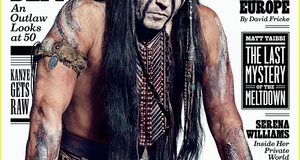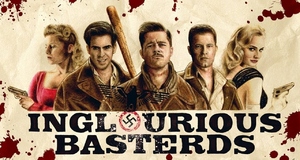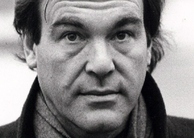Living with Evil: Crime and Sexuality in Bonnie and Clyde and Chinatown
By
2015, Vol. 7 No. 03 | pg. 2/2 | « Much like the swamp of corruption and revelation of sickening sexual crimes in which Chinatown ends, the killing of Bonnie and Clyde reinforces a sense of apathy toward the power which attempts to reinforce the discourse of what is criminal. William Blum argues that “The violence of society's retribution characterizes its response to the exceptional as frightened, hysterical, stupid, and uncomprehending” (30). Such an interpretation of social justice allows an attraction to Bonnie and Clyde’s raw simplicity and moral1 innocence, enhanced by their sexuality. Warren Beatty also carries an automatic sexualisation and sympathy to the character of Clyde due to his star persona, as interpreting a murderous criminal out of such a well known and respected figure becomes unlikely. Instead the title characters draw compassion and understanding at the expense of a brutal, corrupt and conspiring justice system. The inevitability, regularity and normality of private evil acts as a point of comparison with the legal interpretation of crime. Crime may be based upon the influence of power provided by discourse, but acts of individual evil are able to transcend the impacts on individual reasoning resulting from indifference toward social hierarchy, though still relying on a level of historically specific morality. An audience will be impacted by evil in a different manner to legal criminality, as the motivation is often unclear and regularly opaque. Wayne D. McGinnis believes Chinatown shows a “potential for evil in all human aspiration” (249), mirroring Cross’ claim “that at the right time and the right place” one is “capable of anything” (Chinatown), but it is the unexplained nature of this evil which creates an unsurpassable negative reaction toward the character. The employing of sexuality as the vehicle for Cross’ evil creates a sense of the inevitable, but also the natural. The fact he does not “blame himself” (Chinatown) appears an attempt to suggest what he did was merely an inescapable act of human nature. Combined with his vague justification, it implies an animalistic tendency to commit sexual evil. Foucault’s argument, though, theoretically questions even the idea of sexual evil, as sexuality “was taken charge of... by a discourse that aimed to allow it no obscurity” (1504), meaning an audience is unable to ascertain true sexual evil due to the discourse which surrounds and restricts the deconstruction of sexuality.Nevertheless, the authorial intention and the common audience and critical reception is one of horror and disgust. McGinnis, seeking an Oedipal reading of Chinatown, claims Polanski “split the Oedipus figure” (250) between Gettes and Cross. Tragedy, without sympathy, misadventure, doomed aspirations and naivety, becomes evil, in the form of Cross. Gettes provides the intuitive, smooth detective, seemingly capable and determined in rescuing his people from a plague, only to discover a sexual evil which he is unable to wholly comprehend. While Oedipus blinds himself in punishment of his failure to ‘see’, Gettes’ penalty is Evelyn’s death, not coincidently shot through the eye. Moreover, it is the sexualisation of Gettes’ relationship with Evelyn which condemns her, much like Oedipus’ fathering of his siblings forcing his mother’s suicide. As in Oedipus the King, the protagonist is punished for failing to wholly comprehend the evil of the world to such an extent that he contributes to the downfall of the very thing he attempted to protect and causes the events he initially set out to prevent unfolding. Gettes aims to help Evelyn and Catherine escape Cross, only to literally drive him to them. In American cinema, especially from the 1960s into the early 1970s, crime and sexuality were used to express a desire to rebel, to escape the economic and social insecurities and to press for independence. Liberal freedoms, which were becoming lost in a tide of political scandals and ineptitude, could be forcefully reclaimed through crime and sexuality. Bonnie and Clyde, in a 1930s setting, challenge a system seemingly taking from its people; an apt reflection of what was lost to 1960s Americans. Such a failure to adhere to the democratic foundations of the nation questioned American normality, allowing a greater critical analysis of the culture. Looking through Foucault, aided by the sympathetic style of Bonnie and Clyde, crime becomes not immoral in this era, but a sexualised, exotic rebellion. Lined up next to this legal, socially constructed transgression was an idea of evil, that which the contemporary audience truly viewed as morally wrong. Chinatown presents a world filled with this most unsympathetic form of crime. Noah Cross and Frank Hamer commit very different immoral acts, but both are brutal, violent and rooted in a “kind of collusion” suggesting “complication is the genuine evil” (Blum, 30), punishing fundamentally innocent and innocuous characters unable or unwilling to accept the world as it is. Instead they use sex and crime, or sex and solving crime, to find answers and address the presence of evil in the world. However the ultimate, overwhelming, and tragic truth is that they simply cannot evade evil. ReferencesBernstein, Matthew. “Perfecting the New Gangster: Writing Bonnie and Clyde.” Film Quarterly 53.4 (2000): 16-31. FIAF Plus. Web. 16/11/13. Blum, William. “Toward a Cinema of Cruelty.” Cinema Journal 10.2 (1971): 19-33. JSTOR. Web. 16/11/13. Cooper, Stephen, “Sex/Knowledge/Power in the Detective Genre.” Film Quarterly 42.3 (1989): 23-31. JSTOR. Web. 16/11/13. Foucault, Michel. “Discipline and Punish: The Birth of the Prison.” The Norton Anthology of Theory and Criticism: Ed. Peter Simon. United Sates of America: W. W. Norton & Company, Inc., 2010. 1490-1502. Print. Foucault, Michel. “The History of Sexuality, Volume 1, An Introduction.” The Norton Anthology of Theory and Criticism: Ed. Peter Simon. United Sates of America: W. W. Norton & Company, Inc., 2010. 1502-1521. Print. Macnab, Geoffrey. “Song of the Open Road” Sight and Sound 9.8 (1999): 58-59. FIAF Plus. Web. 16/11/13. McGinnis, Wayne D.. “Chinatown: Roman Polanski’s Contemporary Oedipus Story.” Literature/ Film Quarterly 3.3 (1975): 249-251. FIAF Plus. Web. 16/11/13. Bonnie and Clyde. Dir. Arthur Penn. Perf. Warren Beatty, Faye Dunaway, Michael J. Pollard, Gene Hackman. WB, 1967. Film. Chinatown. Dir. Roman Polanski. Perf. Jack Nicholson, Faye Dunaway, John Huston, Perry Lopez. Paramount, 1974. Film. Endnotes
Suggested Reading from Inquiries Journal
Inquiries Journal provides undergraduate and graduate students around the world a platform for the wide dissemination of academic work over a range of core disciplines. Representing the work of students from hundreds of institutions around the globe, Inquiries Journal's large database of academic articles is completely free. Learn more | Blog | Submit Latest in Film & Media |
















